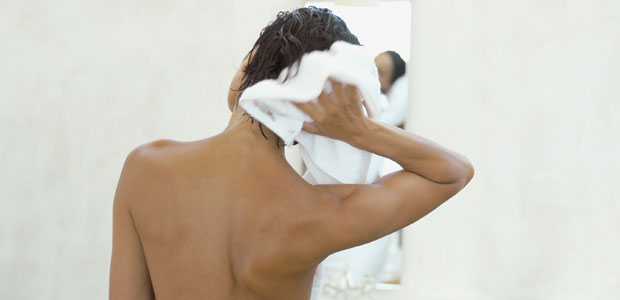Advertisement
Reason to Sweat?
Aluminum and parabens in deodorants mimic estrogens

Body odour annoys officials in San Luis Obispo, California so much that on March 7, 2005 the county prohibited access to the library to people smelling of sweat. Deodorant and antiperspirant manufacturers are more than happy about the ban on BO. Last year Canadian sales topped $48 million.
Rolling a deodorant under the arms after a shower prevents odour, and antiperspirants effectively block sweat ducts. But at what price?
For over 20 years, a controversy has waged about the safety of antiperspirants and deodorants. A leading research scientist, Dr. Philippa Darbre of Reading University in the UK, conducted numerous studies into the links between environmental estrogens and breast cancer. Her most widely publicized report, published in January 2004 in the Journal of Applied Toxicology, showed that deodorant preservatives called parabens had been found in 20 human breast tumours. Further research by Dr. Darbre, published in February 2006 in the Journal of Applied Toxocology, showed that the metal ions in aluminum salts used in deodorants mimic the effects of estrogen.
Yet the Canadian Cancer Society (cancer.ca) does not warn Canadians against the use of conventional antiperspirants and deodorants and will not do so until more research is conducted. In the meantime, do consumers have natural alternatives?
Read the Label
Natural product manufacturers make available a variety of deodorant and antiperspirant products that work effectively to prevent body odour but are not health hazards. Browse the shelves of your natural product store and read the labels. Not all cosmetics include ingredient lists, but if you find products that contain parabens and aluminum salts, avoid them.
Natural mineral crystal deodorants have long served as an alternative to conventional deodorants, but the effectiveness of the crystal deodorants is based on potassium alum or potassium aluminum sulphate. The Alzheimer’s Society published an information sheet on aluminum in June 2002 stating, “There is circumstantial evidence linking this metal with Alzheimer’s disease but no causal relationship has yet been proved.” Dr. Darbre’s newly published research into aluminum salts and xenoestrogens suggests that herbal deodorants and antiperspirants may still be better alternatives to natural crystal deodorants.
A Matter of Personal Choice
When choosing herbal antiperspirants and deodorants, you can decide to smell cool and herby with peppermint- and lavender-based deodorants or spicy with the scent of nutmeg. Perhaps, though, you would prefer perfume-free deodorant and antiperspirant.
Each deodorant has its pros and cons, so try out several until you find the one that suits your lifestyle and works for you and your body chemistry.
Simple Tips
Stay underarm fresh all day by washing with a mild soap morning and evening and before supper if needed–only you will know. Wash workout gear frequently.
Most important, do not stress out over body odour. Relax, and with a little help from a natural deodorant you will feel as fresh as the proverbial daisy.
How Herbs Help
Aloe vera: moisturizer, high in vitamin A and essential fatty acids
Lavender:antiseptic, antiviral, relaxant
Lemon balm:antiseptic, calming
Patchouli:deodorant, astringent, skin tonic, antifungal
Nutmeg:antiseptic, antioxidant




